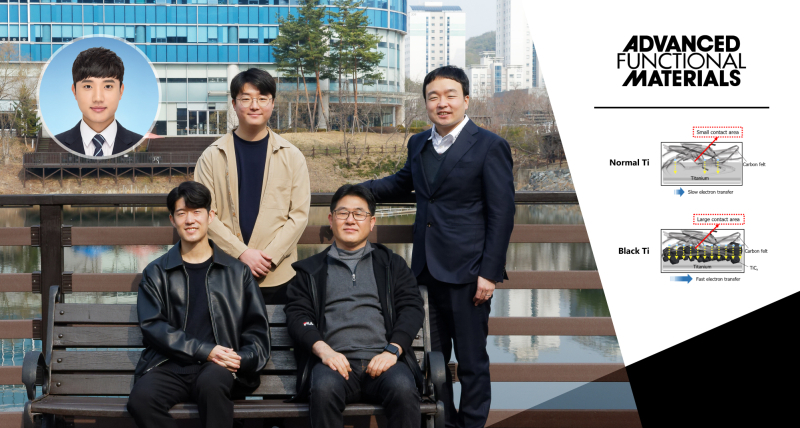A research team, led by Professor Dong Woog Lee in the Department of Energy and Chemical Engineering at UNIST developed a technology that greatly increases the performance of seawater cells by applying a black suit called titanium carbide (TiC) to the surface of titanium (Ti) used as a current collector in seawater cells. In particular, it was found that corrosion of the carbon current collector was suppressed in this process. By systematically analyzing this, it is expected to help design new seawater cell metal current collector research in the future.
A current collector refers to a material that becomes a passage through which electrons move. Among them, the cathode current collector of the seawater battery is composed of a carbon current collector and a titanium metal current collector. Titanium metal current collectors are widely used due to their high stability when they act with seawater.
However, corrosion of carbon current collectors, which often occur in seawater cells and other batteries, is considered a major cause of weakening the cycle stability of batteries. Therefore, it is most important to suppress corrosion of the carbon current collector in order to have high stability.
The research team devised a method to increase the efficiency of seawater cells by preventing corrosion of such current collectors. The TiC-coated titanium (Black Ti) developed by the research team showed chemical, electrochemical, and mechanical stability in the seawater environment. When the developed current collector is used for seawater cells, the performance of the coin type cell is quadrupled, the output performance is improved by 30%, and the voltage interval is reduced by 20%. It also succeeded in applying to primatic type cells, which are large-capacity cells, resulting in a 15% increase in output performance and a 25% and 20% decrease in resistance and voltage intervals, respectively. The research team quantitatively and qualitatively confirmed that the performance improvement factor was due to suppressing corrosion of the carbon current collector.
The findings of this research have been available online in the February 2023 issue of Advanced Functional Materials, ahead of its publication. This study has been supported by the National Research Foundation of Korea (NRF), the Korea Institute of Energy Technology Evaluation and Planning (KETEP), and UNIST.
Journal Reference
Yoonjong Cho, Jeongwoo Park, Wang-Geun Lee, et al., “Prevention of Carbon Corrosion by TiC Formation on Ti Current Collector in Seawater Batteries,” Adv. Funct. Mater., (2023).












